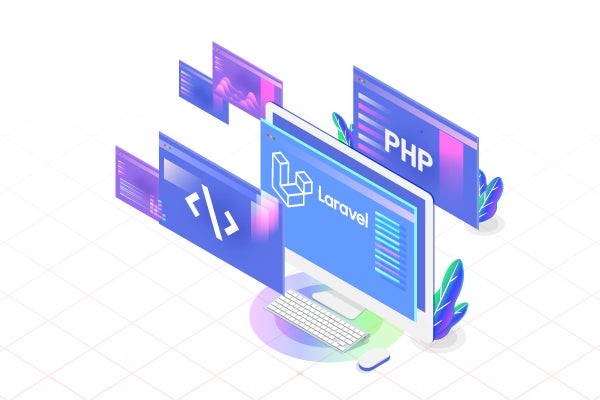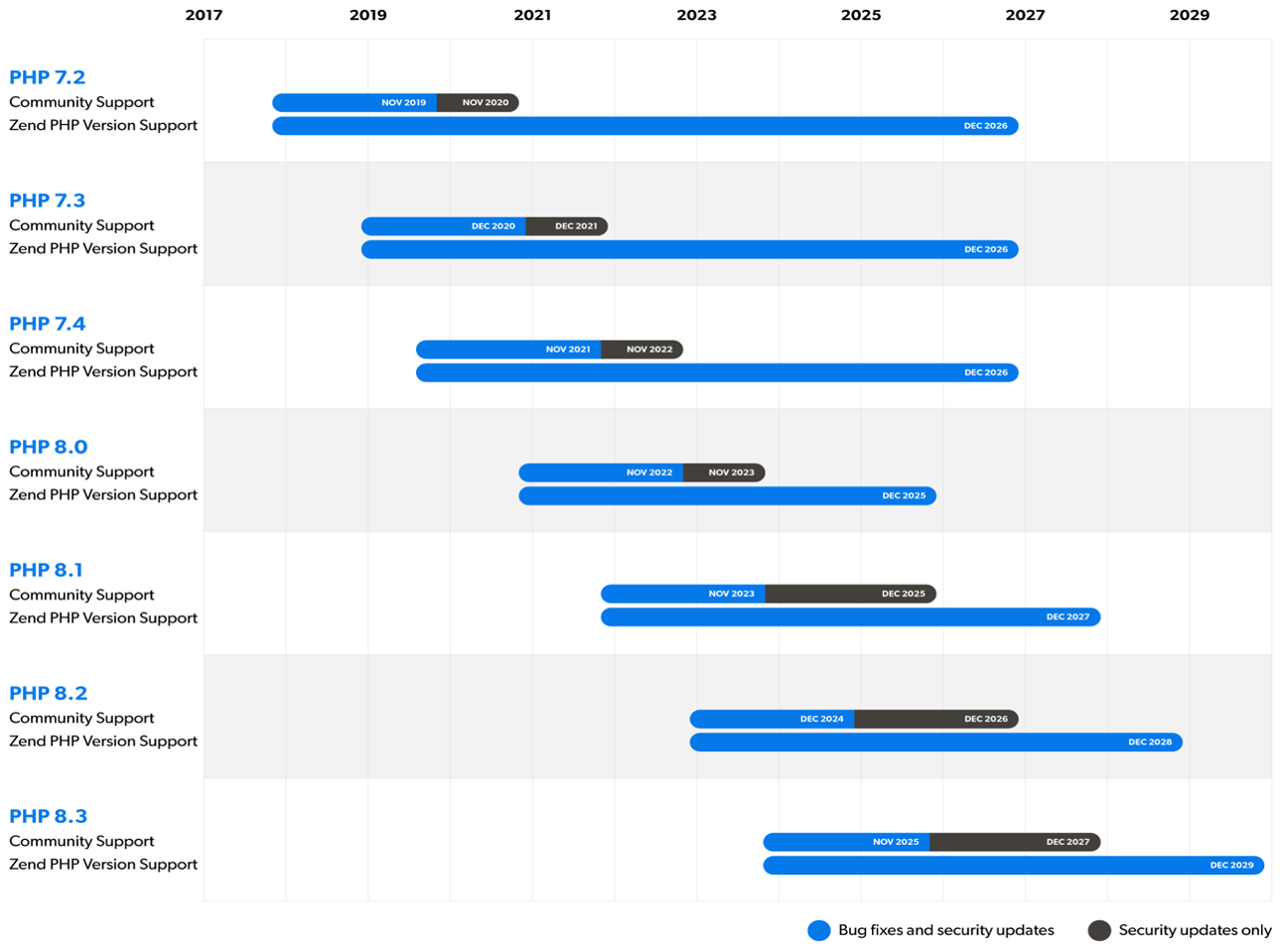
Laravel PHP Requirements and How They Impact Laravel Upgrades
Laravel is one of the most widely used free and open source PHP frameworks available for developer teams. It's popularity is often credited to it's thriving community, scalability, and easy-to use approach. However, to make the most of this powerful framework, developers must understand Laravel PHP requirements and how they impact Laravel upgrades.
In this blog, I introduce the Laravel framework and provide an overview of how it relates to the PHP language. I discuss why using the most up-to-date versions of both PHP and Laravel matter, provide insights into Laravel upgrades, and walk through the Laravel PHP requirements for supported Laravel versions. Finally, I recommend available PHP support options for teams considering a Laravel upgrade.
Laravel Framework: Overview
Laravel framework supplies features for developing, testing, profiling, and deploying web applications. But, before I get to Laravel PHP requirements, it is critical to have a base-level understanding of the Laravel framework.
What Is Laravel?
Laravel is a full stack framework and an ecosystem. It has expressive, elegant syntax, and is the most popular PHP framework used by developers.
Released in 2011, Laravel simplifies some of the most common tasks associated with web projects, including Model-View-Controller (MVC), authentication, authorization, routing, sessions, caching, queuing, and much more. It has a large community forum and tutorials, making it the best documented framework for building PHP apps. In fact, the highly active community is often cited as one of Laravel's main strengths.
Laravel Features
Laravel's success as a PHP framework also is credited to it's impressive list of features. These include:
- MVC architecture
- Package system to install "bundles / packages" and new features
- Robust and flexible routing system
- Eloquent Object-Relational Mapping (ORM) to easily work with databases through a simple and clear syntax
- RESTful APIs
- Artisan, a comand-line tool to help with tasks like database migrations, running tests, and creating custom commands
- Blade Temple system to provide features like template inheritance and sections for reusable code
- Built-in tools for managing user logins and roles
- Scheduler for automating routine tasks such as sending emails or cleaning up the database directly within Laravel
- Pre-packaged development environment for Laravel projects like Homestead
Are Laravel and PHP the Same?
No, Laravel and PHP are not the same, but they are related, as Laravel is a framework built on PHP.
PHP (Personal Home Page) or Hypertext Preprocessor is a scripting language used for building dynamic web pages, scripting procedures, and more. Core PHP is the foundation of all PHP frameworks, including Laravel.
Laravel, on the other hand, is an elegant and expressive framework that uses a modern syntax. It simplifies web development tasks and improves the development experience without hampering functionality or efficiency.
Back to topSimplify Your Laravel PHP Migration
Migrating PHP versions can be difficult. Zend is here to help. We make migrations easy – including migrating code on frameworks like Laravel, Laminas, and others.
Why Laravel Upgrades Matter
In the PHP ecosystem, which includes applications built on a Laravel framework, not staying up to date with the latest technologies and versions can have critical consequences for your business. Failing to upgrade can leave you vulnerable to security breaches, limit your maintenance options, and compromise future scalability.
That's why it's important to be aware of the lifecycle of the frameworks you're using. Every PHP framework, including Laravel PHP framework, will be influenced by the following factors:
- The PHP end of life (EOL) cycle
- Ongoing vulnerabilities and available security patches
- Framework improvements and new features
- Framework integration with external software
These factors are closely related to Laravel's version release cycle. Like most modern technologies, Laravel releases new versions at a regular cadence to improve the framework (with more on this below). Changes in a new Laravel release could include:
- Optimizing the framework code performance to take advantage of new features in the most recent PHP versions
- Optimizing the framework syntax to use the best practices of the most recent PHP versions
- Fixing bugs and security issues discovered in the current Laravel framework code
- Improving integration with components of other frameworks or libraries to make Laravel a "full stack framework" in the PHP ecosystem
Laravel PHP Requirements: How to Keep Pace With PHP Versions
Laravel upgrades matter because the process ensures you can access the newest features and security improvements included in the most up-to-date PHP version.
Every PHP version has a defined community support lifecycle, with each minor release receiving community support for four years. That support is broken down into two phases, active support and security support. After the version reaches the end of the security support phase, the version is considered end of life and no longer receives patches from the community. Any vulnerabilities that occur after the EOL date will remain unpatched.
Due to many businesses delaying upgrades and modernization projects, many Laravel PHP projects currently run on EOL PHP versions. In order to stay up to date and competitive, these Laravel PHP applications must be migrated to a new release that supports current PHP versions. For example, some older Laravel versions do not support PHP 7.4 through PHP 8.X. Moving to a supported PHP version will be necessary to upgrade Laravel.
Access New Features
Upgrading to a more recent version of Laravel will introduce several improvements over the previous version, including enhanced performance, better security features, and new functionalities like integrations with new tools and external libraries (like Symfony).
Improved Security and Bug Fixes
Every software framework, including Laravel, has vulnerabilities that are discovered and patched over time. Running an outdated version means your application is exposed to known security issues that could have been mitigated with an upgrade. Using the most up-to-date Laravel version keeps your critical apps secure, compliant, and performant.
Better Performance
Each new version of Laravel introduces performance optimizations that make your application faster and more efficient. These improvements are often the result of extensive research and development by the Laravel team and community, and they can have a significant impact on your application's load times and responsiveness.
Compatibility and Support
Frameworks evolve to support new web standards, browser features, and third-party integrations. Running an outdated version of Laravel can lead to compatibility issues with modern tools and libraries, making it harder to integrate new features or technologies.
Back to topExpert Support for Planning Laravel Upgrades
Zend Black Belt delivers the expertise of our Professional Services, but in smaller blocks of time. Identify and mitigate risks while planning large-scale or long-term changes to your Laravel application.
What to Know Before Starting a Laravel Upgrade
Every new Laravel version can lead to significant changes in installation requirements. These changes can include upgrading PHP, enabling PHP extensions, new minimum resources, and new memory requirements. Additionally, updating installed components can also involve important changes.
The Laravel Release Cycle
Laravel and its other first-party packages follow Semantic Versioning. Major framework releases are released every year (usually in February), while minor and patch releases may be released as often as every week. However, these minor and patch releases should never contain breaking changes.
For all Laravel releases, bug fixes are provided for 18 months, and security fixes are provided for two years. For all additional libraries, including Lumen, only the latest major release receives bug fixes.
| Laravel Version | Supported PHP Versions | Release | Bug Fixes Until | Security Fixes Until |
|---|---|---|---|---|
| 6 (LTS)* | 7.2 - 8.0 | September 3rd, 2019 | January 25th, 2022 | September 6th, 2022 |
| 7* | 7.2 - 8.0 | March 3rd, 2020 | October 6th, 2020 | March 3rd, 2021 |
| 8* | 7.3 - 8.1 | September 8th, 2020 | July 26th, 2022 | January 24th, 2023 |
| 9* | 8.0 - 8.2 | February 8th, 2022 | August 8th, 2023 | February 6th, 2024 |
| 10** | 8.1 - 8.3 | February 14th, 2023 | August 6th, 2024 | February 4th, 2025 |
| 11 | 8.2 - 8.3 | March 12th, 2024 | September 3rd, 2025 | March 12th, 2026 |
| 12 | 8.2 - 8.3 | Q1 2025 | Q3 2026 | Q1 2027 |
| *End of Life **Security Fixes Only | ||||
Methods for Updating Laravel Versions
Upgrading a Laravel PHP application can be approached in two main ways: manually or through automation tools like Laravel Shift.
The manual approach consists of identifying and resolving compatibility issues, adjusting deprecated code, and carefully updating dependencies step by step. Laravel provides a detailed guide for this process. For each version, reported changes are classified in one of three ways:
- High Impact Changes
- Medium Impact Changes
- Low Impact Changes
High and medium changes must be carefully analyzed before proceeding with a Laravel update.
If you choose to adopt an automated approach by using a tool such as Laravel Shift, you can automate the detection and correction of deprecated or incompatible code, making your Laravel upgrade faster and less error prone. This tool also makes it easy to migrate other frameworks, such as Lumen and Tailwind. However, as it is a commercial tool, Laravel Shift will come with a price tag.
Back to topLaravel PHP Version Requirements
A critical step in completing a Laravel upgrade is to understand the PHP requirements involved, as Laravel requires PHP 8 or a newer version. However, depending on your Laravel PHP application, some additional resources and software will be required:
- A web server, such as Apache, nginx, or Caddy to serve the application
- A database management system such as MySQL, PostgreSQL, SQLite, and/or SQL Server
- Composer installed on your system to manage Laravel dependencies
- Additional PHP extensions, such as OpenSSL, Mbstring, Tokenizer, JSON, Ctype, and Pdo
Let's take an in-depth look at Laravel versions and their PHP requirements.
Laravel 9 PHP Version Requirements
Laravel 9 installation requires the most up-to-date form of PHP 8, "PHPUnit 8", and a number of other prerequisites. Laravel, as a framework, depends on several community-driven and Symfony 9 libraries. The PHP 8 requirement is because Laravel 9 is solely dependent on Symfony's latest v6.0 release, which depends on PHP 8.
PHP extension requirements may differ. Visit the Laravel 9 Upgrade Guide for further details, and see the below list for more information on changes involved in migrating from Laravel 8.X to Laravel 9.
High Impact Changes
- Updating Dependencies
- Flysystem 3.x
- Symfony Mailer
Medium Impact Changes
- Belongs To Many firstOrNew, firstOrCreate, and updateOrCreate methods
- Custom Casts & null
- Default HTTP Client Timeout
- PHP Return Types
- Postgres "Schema" Configuration
- The assertDeleted Method
- The lang Directory
- The password Rule
- The when / unless Methods
- Unvalidated Array Keys
Laravel 10 PHP Version Requirements
Laravel 10 PHP version requirements dropped support of PHP 8.0 and earlier versions, making the minimum required PHP version PHP 8.1 and above. Additionally, Composer 2.2+ is also required for Laravel 10. While upgrading these components to their latest versions to meet the framework's requirements, ensure that "minimum-stability" is set to "stable" in the "composer.json" file.
PHP extension requirements may differ. Visit the Laravel 10 Upgrade Guide for further details, and see below for changes to anticipate when upgrading to Laravel 10.
High Impact Changes
- Updating Dependencies
- Updating Minimum Stability
Medium Impact Changes
- Database Expressions
- Model "Dates" Property
- Monolog 3
- Redis Cache Tags
- Service Mocking
- The Language Directory
Low Impact Changes
- Closure Validation Rule Messages
- Form Request after Method
- Public Path Binding
- Query Exception Constructor
- Rate Limiter Return Values
- The Redirect::home Method
- The Bus::dispatchNow Method
- The registerPolicies Method
- ULID Columns
Laravel 11 PHP Version Requirements
Laravel 11 requires PHP 8.2 or higher and Composer 2.X. Upgrade these components to their latest versions to meet the framework's requirements, and be aware that PHP extensions may have differing requirements. For further details about upgrading to Laravel 11, view the associated Laravel 11 Guide. See below for changes to anticipate when upgrading.
High Impact Changes
- Updating Dependencies
- Application Structure
- Floating-Point Types
- Modifying Columns
- SQLite Minimum Version
- Updating Sanctum
Medium Impact Changes
- Carbon 3
- Password Rehashing
- Per-Second Rate Limiting
- Spatie Once Package
Low Impact Changes
- Doctrine DBAL Removal
- Eloquent Model casts Method
- Spatial Types
- The Enumerable Contract
- The UserProvider Contract
- The Authenticatable Contract
Keep Laravel PHP Applications Supported During Upgrades
As new Laravel versions require PHP 8.0 or newer, maintaining and modernizing your PHP is critical. However, while keeping Laravel PHP applications current sounds great in theory, it is often much more difficult in practice. Upgrades can mean spending significant time and money, and despite the many advantages of using updated versions, upgrading can sometimes be viewed as a distraction from delivering on other business goals.
To extend the lifecycle of your Laravel PHP application, Zend by Perforce offers a variety of solutions to support Laravel PHP apps, including PHP Long Term Support (LTS), ZendPHP, and ZendHQ.
Zend PHP LTS
Long term support for EOL PHP versions – such as Zend PHP LTS, which offers support for PHP 7.2, 7.3, 7.4, and 8.0 – allows you to upgrade Laravel PHP applications on your schedule. Teams are able to adequately plan their upgrade process, allocate developer time and other resources, and consider all factors that could impact your upgrade.
This is particularly important for complex Laravel PHP applications involving many dependencies, custom packages, and/or integrations that are not yet compatible with the latest Laravel version. Upgrading can take substantial work, and LTS services provide the necessary support and extended timeline to ensure that everything functions smoothly. You can stay secure and patched until you're ready to upgrade to a fully supported PHP version.

ZendPHP Secure Runtimes
If you are using an EOL Laravel version but your application is well maintained with no security issues or performance degradation, and if the main reason you are pursuing a Laravel upgrade is to stay on a supported PHP version, then ZendPHP is an excellent solution to extend the life of your Laravel application.
ZendPHP secure and supported runtimes keep your mission-critical Laravel PHP applications secure against the latest CVEs, providing backported security patches to ensure compliance, safety, and security. It also comes with dedicated 24/7/365 support, making our PHP experts your PHP experts. Upgrade on your schedule, access new PHP versions faster, and provision and deploy at scale – all while allowing your team to focus on developing new features to drive your business.
ZendHQ
ZendHQ is the must-have extension for ZendPHP. It is designed to help developers increase Laravel PHP application security, performance, and scalability in cases where support has expired, and your application requires a reactive tool to identify bugs, find security issues, and diagnose performance bottlenecks.
ZendHQ is an intuitive system consisting of a PHP extension, a system daemon, and an admin user interface. In addition to the above capabilities, it monitors HTTP requests to your server and displays data pertinent to your application, including function timings, HTTP requests and response data, and more. These functionalities are enabled through several features built to support your Laravel PHP application and team:
- Z-Ray profiles your application, supplies metrics about memory resources, time performance, bottlenecks, application flow, and more
- Monitoring detects issues before they become problems
- Code Tracing quickly finds and fixes issues in production applications.
Pairing ZendHQ and ZendPHP allows you to update and optimize your Laravel PHP applications on your schedule instead of trying to keep pace with community release cadences.
Back to topFinal Thoughts
When it comes to the PHP ecosystem, failing to stay up to date (whether that's in terms of Laravel versions, PHP versions, or other technologies) can leave your Laravel PHP application vulnerable to security threats, limit maintainability, and negatively impact future scalability. Despite these risks, many companies continue to run older or outdated Laravel and PHP versions due to prioritizing new features over technological maintenance, lack of resources, lack of developer knowledge, and other reasons.
However, keeping your Laravel PHP applications upgraded and secure is essential to the overall success of your business. That's where Zend can help. Our products and services are trusted by global Fortune 100 companies, and we're ready to support your Laravel PHP applications during upgrades, maintenance, and more.
Explore Support Options for Laravel PHP Apps
Zend makes it easy to maintain and upgrade Laravel PHP applications. Use the links below to learn more about our PHP LTS options or explore how ZendPHP and ZendHQ can fit in your infrastructure.
Additional Resources
- On-Demand Webinar - Modernizing Legacy Web Applications: Strategies for a Seamless Journey
- On-Demand Webinar - Are CMS Ecosystems Keeping Pace With PHP?
- Whitepaper - Planning Your Next PHP Migration
- Guide - PHP Versions: Performance, Security, and Feature Comparisons
- Blog - PHP Debugging: Go Beyond Step Debuggers With ZendHQ
- Blog - PHP Upgrades: How to Plan and Execute Your Next Upgrade
- Blog - PHP Migrations: When Is Migrating the Right Choice?

